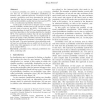Free Online Productivity Tools
i2Speak
i2Symbol
i2OCR
iTex2Img
iWeb2Print
iWeb2Shot
i2Type
iPdf2Split
iPdf2Merge
i2Bopomofo
i2Arabic
i2Style
i2Image
i2PDF
iLatex2Rtf
Sci2ools
118
click to vote
SDM
2010
SIAM
2010
SIAM
On the Use of Combining Rules in Relational Probability Trees
A relational probability tree (RPT) is a type of decision tree that can be used for probabilistic classification of instances with a relational structure. Each leaf of an RPT contains a probability model that determines for each class the probability that an instance belongs to that class. The only kind of probability models that have been used in RPTs so far are multinomial probability distributions. In this paper we show how to integrate a more complex kind of probability models based on the concept of combining rules (such as noisy-or) into RPTs. We introduce two learning algorithms for such RPTs and experimentally compare these algorithms to the learning algorithm for standard RPTs. The experiments indicate that the use of probability models based on combining rules does not significantly influence the quality of the probability estimates of the RPTs. We perform additional experiments to investigate the reason for this result. The main conclusion is that probability models based o...
Data Mining | Multinomial Probability Distributions | Probability Models | Relational Probability Tree | SDM 2010 |
Related Content
| Added | 29 Oct 2010 |
| Updated | 29 Oct 2010 |
| Type | Conference |
| Year | 2010 |
| Where | SDM |
| Authors | Daan Fierens |
Comments (0)

